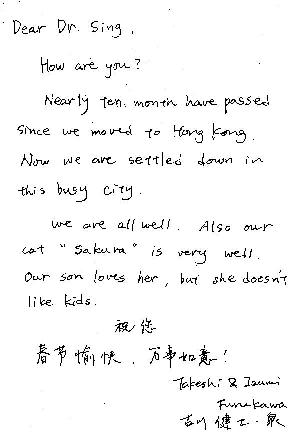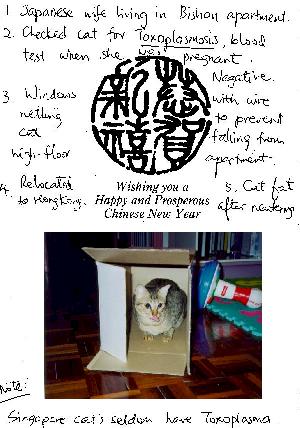0805Toxoplasmosis in the cat and
pregnant woman. Singapore veterinary education stories sponsored by Asiahomes Internet.
Educational article contributed by Dr Sing Kong Yuen. Extracted from The Glamorous Vets,
Singapore, sponsored by Asiahomes Internet, $13.50/40 words/90 days, affordable
internet advertisements for Owners & Realtors.
|
TWO PREGNANT WOMEN WHO
LOVE CATS
"I want you to check this cat for
Toxoplasma," said Mrs Funakawa, a slim lady in her late twenties, relocated to
Singapore with her husband. She was in her first trimester of pregnancy. A
strange request as most pregnant women don't get the pet cat tested for Toxoplamosis.
For Mrs Funakawa, I said the test was unnecessary as her cat had never left the apartment
in Bishan, one of the premier Housing and Development Board estates in Singapore and had
been fed a commercial cat feed after I made a house call. Well, if she wanted to do
the test, it ought to be done.
A drop of blood would be insufficient for testing. How to get a sufficient amount of
blood from a Singaporean cat? Which cat would just sit around and allow a
veterinarian to draw blood? Most likely, a few claws would scratch me if I persist.
Mrs Funakawa agreed that the cat be tranquilised. The jugular vein, being a bigger
vein was used.
A blood sample was sent to the Singapore General Hospital as there were no veterinary
laboratories in the 1980s. The results were negative for Toxoplasma antibodies.
Mrs Funakawa was most happy. As it was very difficult for us to communicate
in English, I was not able to ask why she asked for the house hold cat to be tested.
She had one cat which was fed on commercial cat food and well looked after.
Cats are the only mammal in which the parasite called Toxoplasma gondii will become
infective when passed out in the cat's faeces as oocysts around 19 days after being
infected. These oocysts mature after 24 hours and can become infective in the litter
box or garden soil.
Since Mrs Funakawa lives in an apartment and the cat was not allowed to wander out of the
unit, the cat will be unlikely to be infected with Toxoplasmosis. The Bishan
apartment had wire netting in all the windows to prevent the cat from falling down the
15th floor and therefore the cat had no chance to fall down from high rises. Mrs
Funakawa typifies the well read and informed woman.
The cat was not fed raw or uncooked meat or had a chance to catch rodents or game animals.
It had no chance to catch a rodent. Maybe a lizard or cockroach or two but
these are not the hosts of Toxoplasma.
Therefore, a negative blood test was not surprising. A positive blood test would
mean that the cat had antibodies to Toxoplasmosis and had become infected earlier.
As we could not communicate well in English, I did not ask her why she did not take a
blood test herself. Maybe, she did. I presume the Japanese don't eat
undercooked meat like pork or beef as these are also potential sources of infection.
|
The following week, Mrs Lee, a Singaporean lady came to the Surgery. She was getting
her sixth cat spayed. A slim and active lady working for a real estate agency, she
and her husband were keen to get stray cats neutered and adopted.
"You better get yourself checked for Toxoplasmosis," I said to her. She
was in her first trimester of pregnancy and had been in contact with stray cats.
Stray cats are more likely to be infected with Toxoplasmosis as they eat
undercooked or raw meat and hunt rodents.
I did not see Mrs Lee for the next 10 years as she shifted to Woodlands. We met at
the Woodlands Library one evening.
"Do you remember asking me to check for Toxoplasmosis?" Mrs Lee asked me.
"I had to persist to get my obstretician and gynecologist to take my blood for
a test. Toxoplasmosis is not a common disease in Singapore, I was told."
"I do recall now," I said. Ten years are a long time but this
Toxoplasmosis case struck me as the Japanese woman had sent me a postcard after relocating
to Hong Kong.
Mrs Lee was pushing a 6-month old boy in the pram and was getting into the lift on
the 4th floor of Singapore's showcase library with its tall black granite walls cascading
water falls from a pool at the 4th storey to a pond with rocks below.
"The blood test was positive!" Mrs Lee exclaimed. "The antibody levels were
high and the doctor said I had been infected!"
"What happens to the foetus?" I asked.
"I was given a choice to abort the foetus as it was developing and the parasite would
have been carried via the blood stream to infect it. It might be born blind or infected
and would need a daily blood test after it was born. It might be retarded."
"What happens then?" I enquired. No mother would want to abort her first
child.
"The doctor said that the new born would need to be tested for Toxoplamosis daily.
Poor thing. Imagine needles sticking to a new born baby to get blood every day."
"Why must blood be taken daily?" I asked. Mrs Lee could not answer such a
technical question.
"In any case, the doctors would not be able to cure the baby if it had been infected
with Toxoplasmosis. It could be in the brain, the eye or anywhere in the muscle
tissue." I had no comment as I was not an infectious disease specialist in
human medicine.
"So what did you decide?" I asked again.
A librarian was approaching us to ask us not to talk in the library. Small children were
running about and screaming in this new library, opened in the heartland of Singapore's
most isolated housing estate in North Singapore. The Woodlands Resource Library was
just opened in 2001 and its resource computers with the new anti-glare LED screens were
fully booked by children this evening. You must have thought that Singapore, with
the highest percentage of myopic children would be using the computers to learn new
knowledge. Actually, they and a few adults were playing a game called
"PETS" defeating the purpose of the library as a resource and research hub.
They ought to be banned!
"We better get out of the library. Well, the doctor said that the foetus in the
first trimester of pregnancy was developing rapidly and would be most vulnerable."
Mrs Lee said. I thought the baby was vulnerable all the time as the oocysts cross
the placenta via the blood stream of the mother.
"What was your decision," I asked. Her husband was beside her and did not
say anything. Abortion was her decision.
"What's happen to the six cats?" I asked. They were given away and she now
kept a dog.
"It might not be due to cats as I love to eat raw salmon too," said Mrs Lee as
she hurried down the lift.
Eating undercooked or raw pork or beef infected with the oocysts in the muscle may be a
cause but the salmon is not a mammal and therefore not a source of Toxoplasma gondii
infection! Heating meat to 151 degrees F would kill all oocysts or deep freezing
meat to minus 80 degrees F, not the normal freezing would kill the oocysts. But how many
of us will take such precautions?
For pregnant women with cats, the following may be sensible precautions as most infected
cats don't show clinical signs of Toxoplasmosis like fever, weight loss, inactive or
unsteady behaviour or difficulty in breathing:
Avoid contact with cat faeces which may contain oocysts if your cat wanders outside and is
not fed commercial cat feed.
1. Cat litter. As the Toxoplasma oocysts become infective after 24 hours of
being excreted in the faeces, get somebody to change the cat litter, using a scoop twice a
day. Use hot water to scald the litter box. Wear gloves if you have to do it
yourself.
2. Vegetables. Wear gloves to wash vegetables thoroughly as the soil may
contain the oocysts if the cat had been there.
3. Meat. Wear gloves when preparing meat. Do not eat undercooked pork or
beef or any game animals. Mammals are the hosts of Toxoplasma not fish.
|



